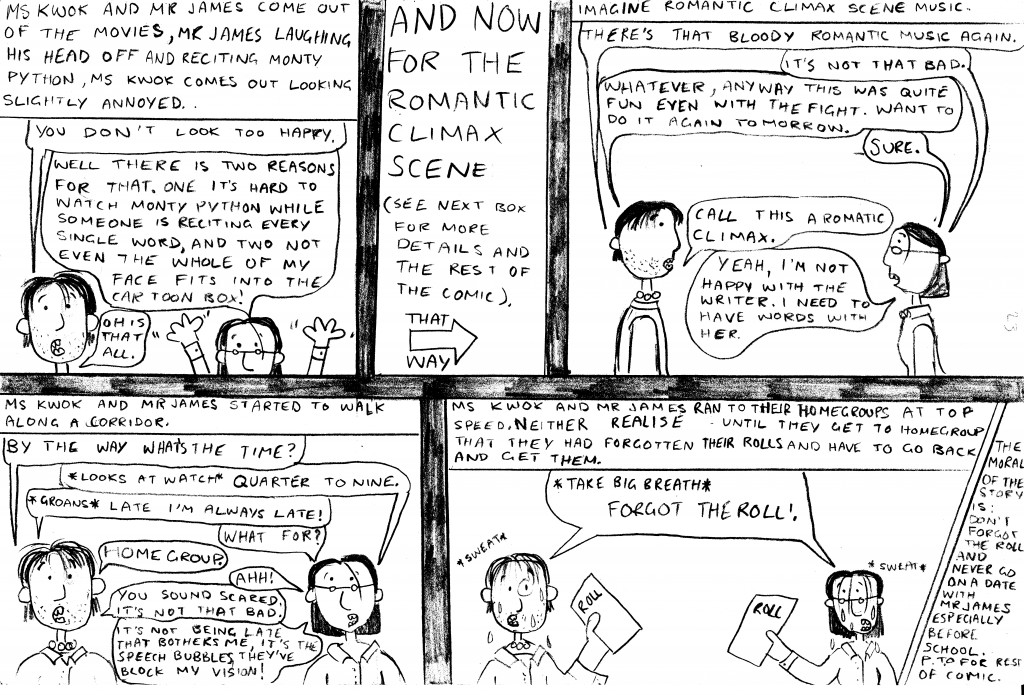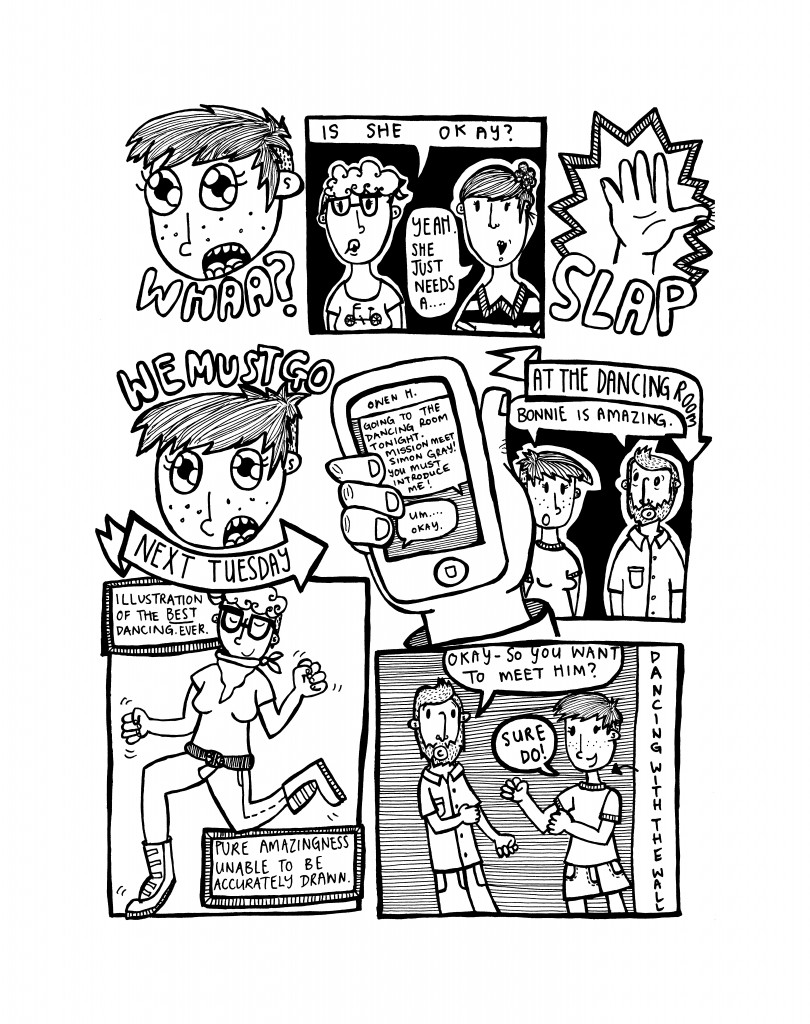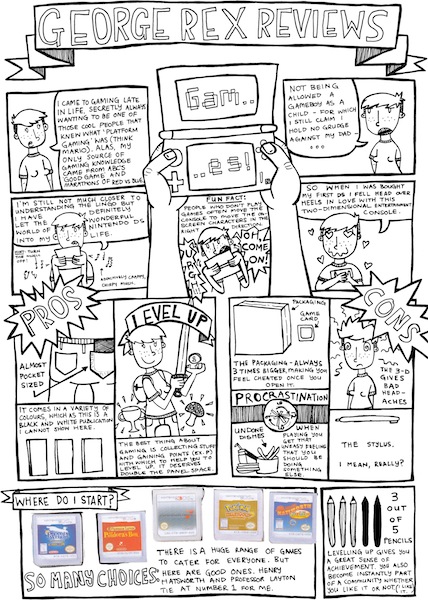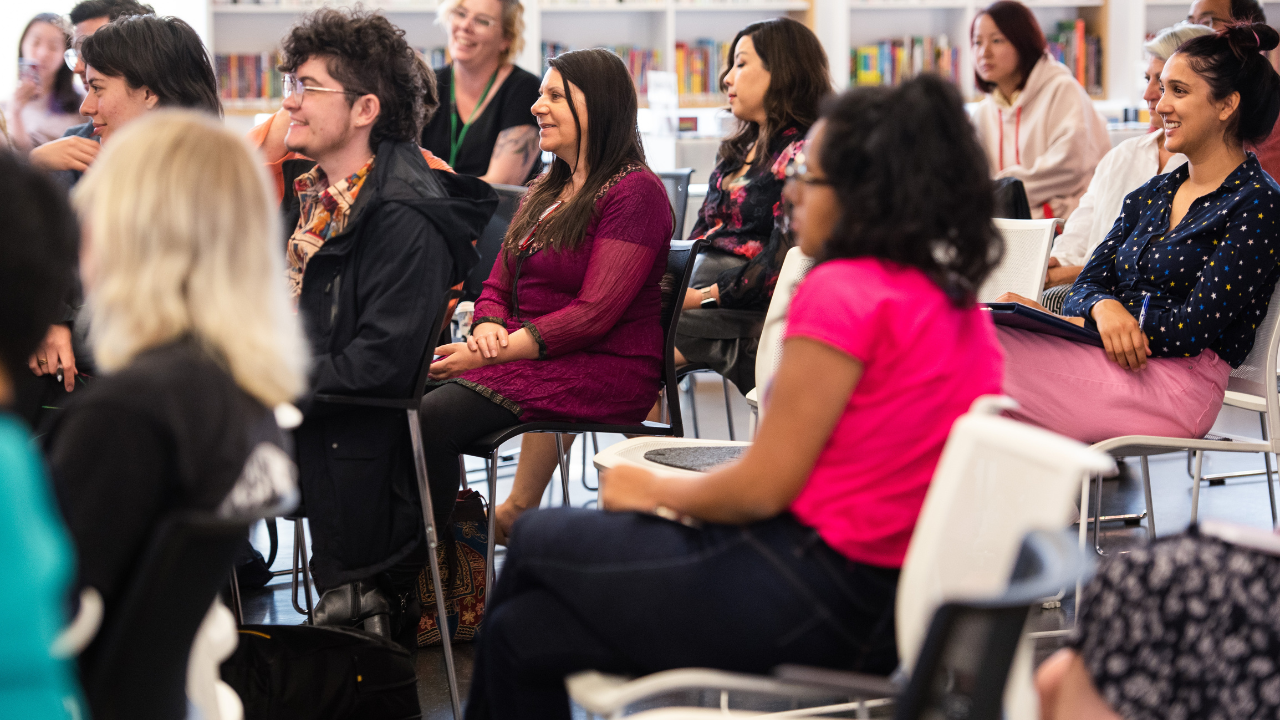Come to Georgina’s workshop here (kids only!)
I’ve been writing and drawing comics for almost as long as I can remember and have found comics the perfect medium to help me share the stories I have to tell. ‘Why comics?’ I hear you ask—well, let me explain!
I love reading, writing and telling stories. You will probably never see me with anything less than two notebooks or sketchbooks, a pencil case filled to the brim and a book to read. However, when it comes to plain prose my writing often lacks what I know it should have. I know how I want things to sound but the moment pen hits paper, I lose it. Years of being taught grammar disappears, any pretense that I can spell is dropped and the amount of words I use to describe things is obscene.[1]
In comics, though, your word count has to drop, otherwise you end up with comics like this:
Fig. 1 excerpt from my high-school ‘Teachers Comics’ illustrated when I was 13. I’d been drawing comic like pictures for a while but this was one of my early attempts at full stories.
The great thing about comics is that you don’t have to describe the characters or the scene because they are standing right in front of you, ‘acting out’ the scene you want them to. The artist can inform the reader, at a glance, whether this is a fantasy-filled adventure tale or a story of gritty realism.
Comics are in this unique position of being quite malleable. There are no strict rules about how you set up your page layout or how you letter your font or how to ink the page or how you package the final product. This gives the creator a wonderful freedom that other styles can’t always offer. There are lots of ways to write a book, but in the end they are mostly text on a page. With all the elements that make up the final product, comics creators can take inspiration or techniques from film or prose and poetry or the visual arts or even music (not to mention other comics!).
When I was younger, I loved to read but often found it hard to concentrate on a book with a lot of text. Sometimes I’d get headaches, or the words would get all jumbled up, and even though I loved reading I found it difficult to get myself to do it. I was pretty lucky that my parents would read to me most nights, even until I was a teenager, but it wasn’t until I started reading comics that really started to devour anything I could get my hands on. Comics are often seen as childish or for people who can’t or won’t read. Comics helped me, someone who wanted to read novels, to read better. They helped me teach myself to concentrate when reading. They helped connect the visual cues described in books to what I could see in my head.
It took me a while to knock down the words in my comics and start to rely more on the visual cues like facial expressions and scene setting panels to help advance my stories. But once I did, my stories began to flourish.
Fig 2. A more recent comic that is a little less wordy and a little more visual.
I still sometimes struggle with cutting the word count down.
Fig 3. Example of current work with too many words
My favourite artists that are currently producing work are mostly situated in the camp of Young Adult fiction (definitely not all: if you ever want to talk about the underground comics of the late ’80s or early ’90s, I’m your fangirl!). I have no shame reading any of these fantastically crafted stories and neither should you! Here is a list of YA graphic novels I’d totally recommend you reading and sharing with your children or cousins or friends or nephews and nieces or partners or dogs or whoever:
- Americus by MK Reed & Jonathon Hill
- Anya’s Ghost by Vera Brosgol
- Scott Pilgrim by Bryan Lee O’Malley
- American Born Chinese by Gene Luen Yang
- Friends With Boys by Faith Erin Hicks
- Zita the Space Girl by Ben Hatke
- Smile by Raina Telgemeier
- Bone by Jeff Smith
And if you want more, I highly recommend checking out the publisher First Second Books. They provide some really spiffy YA graphic novels.
If you ever want to talk or ask me anything about comics, I’d love to chat!
I leave you with one final note about literature. Not all books should be about mystery-solving teens. Just most of them.
[1] I love foot notes for this very reason – extra words to describe stuff, space to go on tangents that the reader probably doesn’t want to go on with me. Unfortunately, reading novels by the master of the footnote, Terry Pratchett, has only encouraged me to continue this habit. He is much much much better at writing footnotes than I.










